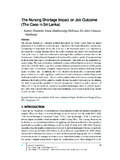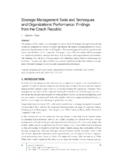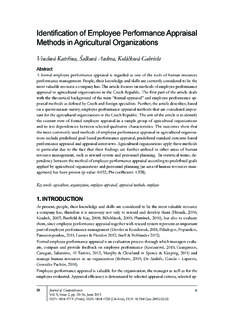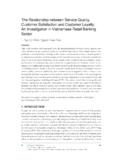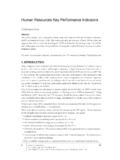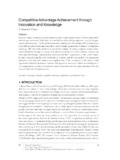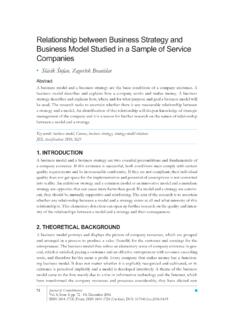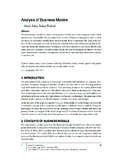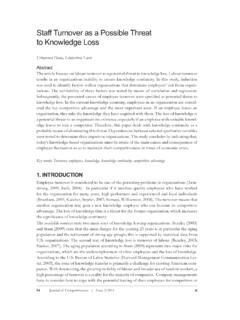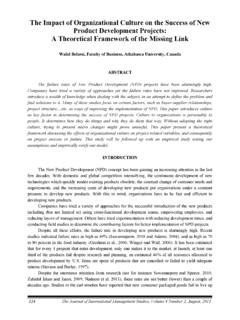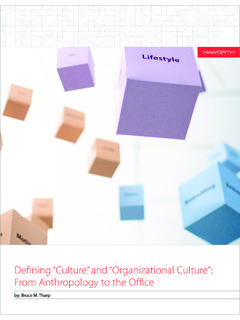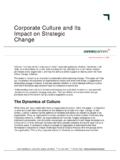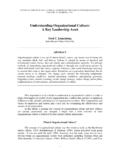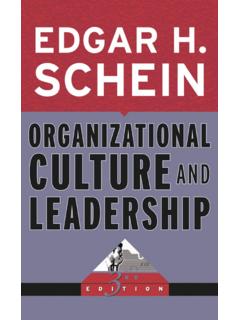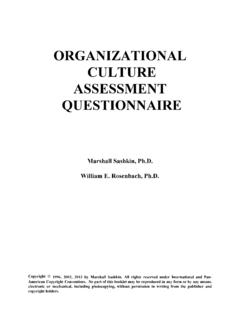Transcription of Relationship between Organizational Culture and ...
1 Journal of Competitiveness | Issue 4/2011 Relationship between Organizational Culture and Performance Management Practices: A Case of University in PakistanUl Mujeeb Ehtesham, Tahir Masood Muhammad, Shakil Ahmad MuhammadAbstractThe aim of this study is to expand the base of knowledge and empirically test the Relationship between the components of Organizational Culture and performance management practices. The study adopted the exploratory research approach to explore the impact. In this study, primary data was collected through questionnaires from 140 employees at the COMSATS Institute of Information Technology. The sample consists of both male and female faculty members. The regression and correlation statistical analysis were used. The results from the statistical analysis show that, involvement is highly correlated with consistency and adapt-ability. Similarly, the other dimensions of Organizational Culture have a positive significant Relationship with the performance management practices.
2 Key words: Performance Management Practices, Organizational Culture1. INTRODUCTIONR ecent literature proved that management of human resource in company has become an increasingly important for firm performance and business vision achievement. Employees are considered as valuable assets to an organization, which require effective management of these employees in firms. A lot of research in Organizational theory has focused on developed coun-tries; 95 percent and whereas only 5 percent of the studies testing Organizational theories are found to be done in developing countries (Farashahi et al., 2005) inspite of the highly dynamic environment. A number of scholars have questioned the applicability of western management practices in developing countries and since long time it has also been recognized that Culture is a main source of difference in performance management practices (Daniels et al., 2004; Piercy et al.)
3 , 2004). Many researchers ( , Denison, Haaland, & Goelzer in Yilmaz, 2008) have called to investigate the phenomenon of Organizational Culture in different cultural context particu-larly in non-western nations. Organizational Culture and performance relation has been examined by many researchers (Og-bonna & Harris, 2000; Rousseau, 1990; Kotter & Heskett, 1992; Marcoulides & Heck, 1993), not much research has been done on Organizational Culture as a contextual factor of perform-ance management (Magee, 2002). Therefore the second purpose of this paper is to determine the Relationship between components of Organizational Culture and performance management practices, a pervasive human resource development and management practice. This study is indented to fill these theory of Organizational Culture implicitly explain the cultural traits of Organizational perfornace, while performance management practices as fundamental human resource man-agement practice support the view that employees and managers benefit from the 18:06:47 ing of Organizational Culture as a contextual factor.
4 For the present empirical analysis Denison theory of Organizational Culture is employed which focuses on four cultural traits involvement, consistency, adaptability, and mission as key determinants of business performance. 2. LITERATURE R Organizational CultureHaving established that Organizational Culture comprises a range of complex social phenom-ena, it is not surprising that scholars have identified corporate Culture as a multi-layered con-struct which can be divided into layers according to these phenomena s observability and ac-cessibility. Organizational Culture has been defined as patterns of shared values and beliefs over time which produces behavioral norms that are adopted in solving problems (Owens 1987; Schein, 1990). The organization s internal environment is represented by its Culture and is construed by the assumptions and beliefs of the managers and employees (Aycan et al., 1999).
5 Organizational Culture manifested in beliefs and assumptions, values, attitudes and behaviors of its members is a valuable source of firm s competitive advantage (Hall, 1993; Peteraf, 1993) since it shapes Organizational procedures, unifies Organizational capabilities into a cohesive whole, provides solutions to the problems faced by the organization, and, thereby, hindering or facilitating the organization s achievement of its goals (Yilmaz, 2008). Performance ManagementAccording to Armstrong and Baron (1998), performance management is a strategic and inte-grated approach to delivering sustained success to organizations by improving the perform-ance of the people who work in them and by developing the capabilities of teams and indi-vidual contributors. It supports the rationale that people and not capital provide organizations with a competitive advantage (Reynolds & Ablett, 1998). The purpose of performance man-agement is to transform the raw potential of human resource into performance by removing intermediate barriers as well as motivating and rejuvenating the human resource (Kandula, 2006).
6 Competitive capacity of organization can be increased by building strong people and effectively managing and developing people (Cabrera & Banache, 1999) which is in essence performance The Relationship between Organizational Culture and Performance ManagementAccording to Kandula (2006) the key to good performance is a strong Culture . He further main-tains that due to difference in Organizational Culture , same strategies do not yield same results for two organizations in the same industry and in the same location. A positive and strong Culture can make an average individual perform and achieve brilliantly whereas a negative and weak cul-ture may demotivate an outstanding employee to underperform and end up with no achievement. Therefore Organizational Culture has an active and direct role in performance management. Mur-phy and Cleveland (1995) believe that research on Culture will contribute to the understanding of performance management.
7 Magee (2002) contends that without considering the impact of or-ganizational Culture , Organizational practices such as performance management could be coun-terproductive because the two are interdependent and change in one will impact the 18:06:48 Journal of Competitiveness | Issue 4/2011 Denison s framework of Organizational Culture :Yilmaz (2008) states that: Following Schien (1984) at the core of Denison s model are the underlying beliefs and assumptions that represent the deepest levels of Organizational Culture . These fundamental assumptions provide the foundation from which (1) more surface-level cultural components such as values and observable artifacts symbols, heroes, rituals, etc. are derived, and (2) behavior and action spring (Denison, 2000). (p. 292)In Denison s model comparisons of organizations based on relatively more surface-level values and their manifest practices are made.
8 Such values are deemed both more accessible than the assumptions and more reliable than the artifacts (Denison, 2000 in Yilmaz, 2008). Denison s Organizational Culture model is based on four cultural traits involvement, consist-ency, adaptability, and mission that have been shown in the literature to have an influence on Organizational performance (Denison, 1990; Denison & Mishra, 1995).The four traits of Organizational Culture in Denison s framework are as follows:Involvement: Effective organizations empower their people, build their organizations around teams, and develop human capability at all levels (Lawler, 1996). Executives, managers, and employees are committed to their work and feel that they own a piece of the organization. Peo-ple at all levels feel that they have at least some input into decisions that will affect their work and that their work is directly connected to the goals of the : Organizations also tend to be effective because they have strong cultures that are highly consistent, well coordinated, and well integrated.
9 Behavior is rooted in a set of core values, and leaders and followers are skilled at reaching agreement even when there are diverse points of view (Block, 1991). This type of consistency is a powerful source of stability and internal integration that results from a common mindset and a high degree of : Ironically, organizations that are well integrated are often the most difficult ones to change. Internal integration and external adaptation can often be at odds. Adaptable organizations are driven by their customers, take risks and learn from their mistakes, and have capability and experience at creating change (Nadler, 1998). They are continuously changing the system so that they are improving the organizations collective abilities to provide value for their customers (Stalk, 1988).Mission: Successful organizations have a clear sense of purpose and direction that defines or-ganizational goals and strategic objectives and expresses a vision of how the organization will look in the future (Ohmae, 1982; Hamel & Prahalad, 1994).
10 When an organization s underly-ing mission changes, changes also occur in other aspects of the organization s CONCEPTUAL M ODEL AND HYPOTHESESThe research is mainly aimed to investigate the Relationship between Organizational Culture and the practices of performance management. Denison s model proposes that organizations with a higher combined measure of the four Culture traits show higher levels of performance which itself is the result of performance management. Therefore the first hypothesis is H1: Organizational Culture has a significantly positive Relationship with performance management 18:06:48 1 Denison s theory states that each of the four major cultural traits promotes superior firm per-formance. Since performance management also results in superior performance, therefore we posit thatH2: Cultural traits of involvement, consistency, adaptability, and mission in organiza-tions exert a significantly positive influence on performance management 1 - A conceptual model of organization Culture and performance management practices.
